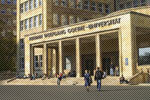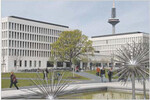Psycholinguistics

Psycholinguistics
Psycholinguistics addresses two major questions. First, how is our grammatical knowledge put to use during language production and language comprehension? Second, how do we acquire the knowledge of grammar during early childhood or later? Psycholinguistic research at the Goethe University Frankfurt addresses both questions – the acquisition of language is the topic of the acquisition lab headed by Prof. Schulz, the mental processes underlying the production and comprehension of language are investigated at the language processing lab headed by Prof. Bader.
Language Acquisition
The acquisition of language is considered one of the most impressive feats in human development. This part of the MA program provides insight into what characterizes typical and atypical developmental paths in the central domains of syntax, semantics, and phonology. The acquisition of interface phenomena that involve sentence-level semantics and syntax, like the different readings of relative clauses or of wh-questions, represent a core research interest of our unit. Theoretically controversial topics such as the modularity of the language system or the existence of a sensitive phase for language acquisition are best investigated by comparing different language acquisition types. We compare differences between various acquisition contexts (e.g., monolingual versus early second language acquisition) to investigate the influence of age-related and cognitive factors on development. We also examine development in the context of language disorders, such as Specific Language Impairment, to shed light on the underlying mechanisms of the acquisition faculty.
We work with a range of experimental methods to study children’s production, and to tap into language comprehension and processing. The program will familiarize you with a range of psycholinguistic methods, including elicited production and imitation, picture selection, and truth-value judgement. These procedures will enable you to conduct your independent research project. For this purpose, you will have access to an experimental booth in our lab. You will also benefit from our wide range of contacts among the local day care centers, kindergartens and schools. Due to the large multilingual community living in Frankfurt, participants with different linguistic profiles are never hard to find!
Language Processing
Language production and language comprehension are seemingly easy tasks that we perform routinely and quickly. On closer scrutiny, however, these tasks turn out to be quite intricate. This part of the MA program investigates how we nevertheless manage to comprehend and produce language without much effort. Collecting empirical evidence about mental operations while processing language is our most important tool to address this question. Therefore, we perform all kinds of experiments in our psycholinguistic laboratory. We examine, among others, word order phenomena and the production of referential expressions in production experiments by means of picture description. Language comprehension is investigated using eye-tracking. Moreover, we conduct studies based on questionnaires and we analyze text corpora, e.g. to investigate syntactic phenomena. Students focusing on language processing will not only acquire theoretical knowledge about scientific empirical methods, but are also given access to the language processing lab in order to pursue their own research interests.
In addition to investigating language processing at the various linguistic levels, a further main topic addresses individual differences in language processing related to working memory as well as language impairment due to brain damage.
Psycholinguistics between Theoretical Linguistics and Cognitive Science
A distinguishing feature of psycholinguistics is its wide thematic range, which allows students to integrate any linguistic field of interest, like phonology, syntax, semantics, and pragmatics. Moreover, psycholinguistics connects linguistics with the broader field of cognitive science by investigating the relationship between language and cognition and by asking how language is related to processes in the brain.
Phonology

Phonology
Phonology is the part of grammar that studies the sound structure of language. The phonologists in Frankfurt cover a large range of phonological research and are tightly connected with phoneticians, syntacticians, morphologists, semanticists, typologists, and psycholinguists.
The module phonology within the master program is designed to be research-oriented. The module's curriculum is intended to extend the student's knowledge in segmental and suprasegmental (prosodic) phonology so that they are in a position to motivate, plan, and conduct their own research studies.
Central aspects of teaching and research concern phenomena that lie at the interface between phonology and other grammatical domains, like morphology, syntax and information structure. Further research topics are:
How does phonology express morphological, and syntactic (or even semantic) structure?
How do we explain similarities and differences in the sound structures of different languages?
How do speech sounds evolve in time?
The overarching aim of teaching and research is making empirical data inform formal models of phonology (and grammar at large). To this end, MA students learn formal methods (linear and non-linear generative grammar, Optimality Theory, metrical theory, etc.), as well as empirical methods (fieldwork, laboratory phonology, psycholinguistic and corpus methods for instance).
Schwerpunkt 3 (Fachbeschreibung)

Lorem ipsum dolor
Consetetur sadipscing elitr, sed diam nonumy eirmod tempor invidunt ut labore et dolore magna aliquyam erat, sed diam voluptua. At vero eos et accusam et justo duo dolores et ea rebum. Stet clita kasd gubergren, no sea takimata sanctus est.
Schwerpunkt 4 (Fachbeschreibung)

Lorem ipsum dolor
Consetetur sadipscing elitr, sed diam nonumy eirmod tempor invidunt ut labore et dolore magna aliquyam erat, sed diam voluptua. At vero eos et accusam et justo duo dolores et ea rebum. Stet clita kasd gubergren, no sea takimata sanctus est.
Schwerpunkt 5 (Fachbeschreibung)

Lorem ipsum dolor
Consetetur sadipscing elitr, sed diam nonumy eirmod tempor invidunt ut labore et dolore magna aliquyam erat, sed diam voluptua. At vero eos et accusam et justo duo dolores et ea rebum. Stet clita kasd gubergren, no sea takimata sanctus est.



